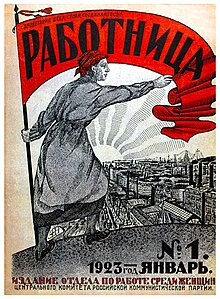Rabotnitsa

1923 cover of Rabotnitsa
|
|
| Frequency | Monthly |
|---|---|
| Year founded | 1914 |
| Country | Soviet Union/Russia |
| Based in | Moscow |
| Language | Russian |
Rabotnitsa (Russian: Работница; English: The Woman Worker) is a women's journal, published in the Soviet Union and Russia and one of the oldest Russian magazines for women and families. Founded in 1914, and first published on Women's Day, it is the first socialist women's journal, and the most politically left of the women's periodicals. While the journal's beginnings are attributed to Lenin and several women who were close to him, he did not contribute to the first seven issues.
It was re-organized in May 1917 as a Bolshevik journal administered by the Zhenotdel, the Women's Section of the Central Committee of the Communist Party of the Soviet Union, becoming their central publication. Later that year, its editors organized the First Conference of Working Women of the Petrograd Region, promoting the Bolshevik cause in the elections to the Constituent Assembly. From the start of the Russian Revolution of 1917, Rabotnitsa served as the official women's publication under the Communist Party in Russia.
The journal Rabotnitsa was established in 1914 in St. Petersburg. While some state it was initiated by Nadezhda Krupskaya, Lenin's wife, the idea is credited to Konkordiia (née Gromova) Samoilova.Inessa Armand, a close friend of Lenin, was instrumental in actualizing the magazine.Anna Yelizarova-Ulyanova, one of Lenin's sisters, found a press willing to print two issues per month. The first editor was a male, Felix Vasilievich Martsinkevich, while the publisher was a female, D.F. Petrovskaia, the wife of a Bolshevik Duma deputy. Its editorial board was composed of Armand and Samoilova, as well as A. I. Yelizarova-Ulyanova, N. K. Krupskaya, P. F. Kudelli, L. R. Menzhinskaya, Y. F. Rozmirovich, and L. N. Stal. It prospered at the encouragement and support provided by Lenin. It was published by Izdatel'stvo "Pressa" in the Russian language. The money needed to support the publication was collected from women workers.
...
Wikipedia
